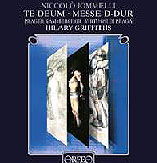Nicolo Jommelli (1714-74) is one of those composers who enjoyed great success in his day but now is all but forgotten–a pity, since he penned some very lovely music throughout his long and prolific career. Of course in another sense Jommelli’s obscurity is understandable because, as evidenced on this new Orfeo recording of his Te Deum and Mass in D, his music never seems to transcend the face value of that loveliness. Take for example the opening Te Deum: It’s a fine work reminiscent of the Te Deum composed by Jommelli’s earlier contemporary, George Frederic Handel. While smaller in scale and less musically ambitious than Handel’s offering, Jommelli’s work is imbued with a similar buoyancy and grandeur. Especially notable are the second-movement Aria “Te ergo quaesumus” and third-movement Coro “Aeterna fac”, which feature glorious singing from soprano Judy Berry and contralto Marta Benacková. In 1787 music critic Johann Adam Hiller wrote, “I could not say much about Jommelli’s Te Deum although there is surely beauty in it.” That just about sums it up.
Equally charming is the Mass in D that Jommelli composed three years later. It’s a grand work that’s stylistically similar to, though admittedly less inventive than the liturgical efforts of Jommelli’s later contemporary Franz Joseph Haydn. All the elements here are expertly crafted. The cantabile melodies, the balances between the ensemble, soloists, and chorus, and the ever-tasteful ornamentation all combine for a remarkably safe, coherent outcome. Conductor Hilary Griffiths expertly leads the Virtuosi di Praga, Prager Kammerchor, and soloists Judy Berry, Marta Benacková, John La Pierre, and Nikolaus Meer. He apparently feels the need to resurrect these works from their undeserved obscurity, and I can’t imagine another conductor bringing more life and passion to Jommelli’s pages. Complementing Griffiths’ efforts are the usual first rate sonics, well written notes, and presentation we’ve come to expect from Orfeo. A noble undertaking recommended to scholars, collectors of 18th century choral obscurities, and all in need of just one more lovely mass.
































